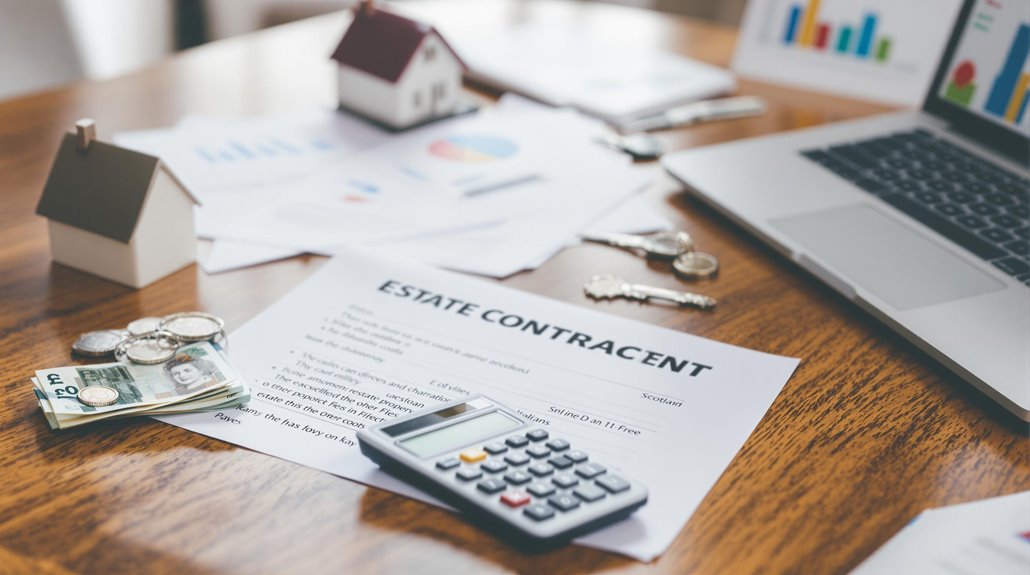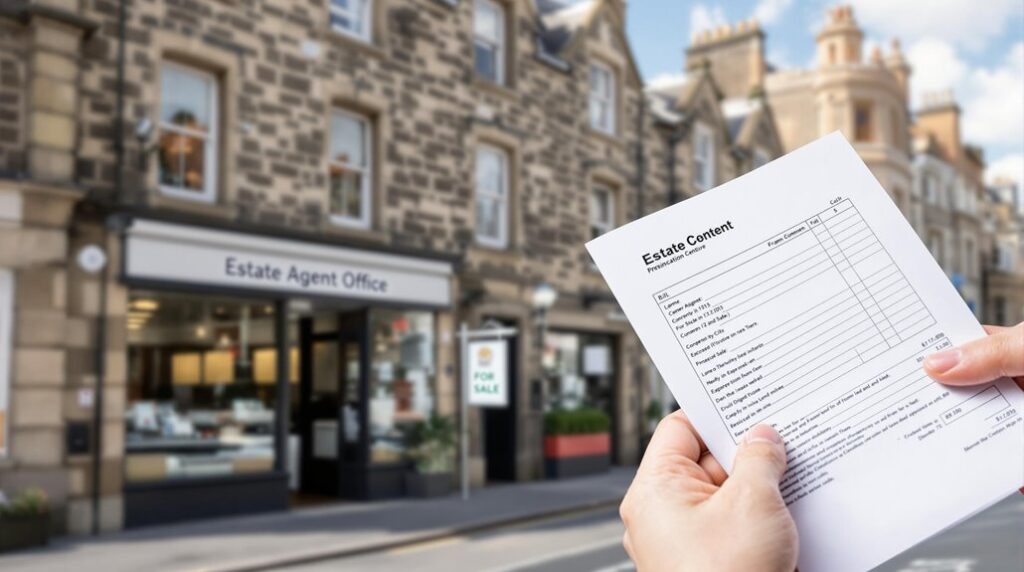I’ve watched Scottish homeowners hand over thousands more than necessary to estate agents, simply because they didn’t understand what they should actually be paying. With property values climbing across Scotland, that standard 1.5% commission isn’t as innocent as it looks—and many agents are quietly pushing rates even higher. Before you sign any agreement, there’s something vital you need to know about how these fees really work and where you might be getting stung.
Key Takeaways
- Average estate agent commission in Scotland is approximately 1.5%, costing around £2,955 for a typical property sale.
- Scottish fees are generally lower than UK averages due to lower absolute property prices compared to London and South East.
- Urban areas like Edinburgh and Glasgow offer more agent competition, potentially securing lower percentage rates than rural locations.
- Total selling costs often exceed agent fees, including £300-£900 for Home Reports and £800-£1,500 for legal expenses.
- Negotiate sliding scale commissions or fixed-fee arrangements to avoid paying inflated costs from rising property values.
What Estate Agents Actually Charge in Scotland Right Now

When you’re preparing to sell your property in Scotland, you’ll find that estate agent fees typically range from 1% to 3% of your home’s sale price, though the exact amount depends on several key factors.
Most agents charge a percentage of your final sale price, which means you’re paying more as property values rise. However, you’ve got negotiating power – many sellers successfully reduce these rates, especially in competitive markets like Kirkcaldy where rising prices have prompted agents to offer more attractive deals.
Your fee depends on whether you choose a high-street agent (typically higher fees) or online agent, plus the service package you select. Sole agency agreements usually cost less than multi-agency arrangements, and some agents offer fixed fees as an alternative to percentage-based pricing. Based on current market data, the average estate agent commission in Scotland is 1.5%, which would cost around £2,955 for a typical property sale.
How Much You’ll Pay Based on Your Property Value
Three key factors determine exactly how much you’ll pay your estate agent: your property’s sale price, the percentage rate you negotiate, and whether that rate includes VAT.
Here’s what you’re looking at: a £200,000 property with a 2% fee costs £4,000, while the same percentage on a £300,000 home jumps to £6,000. I’ve found that higher-value properties often secure lower percentage rates – agents know they’re earning more in absolute terms.
Don’t forget your other unavoidable costs. You’ll pay £250-£750 for the mandatory Home Report regardless of property value, plus £500-£1,500 for conveyancing. Additionally, many sellers overlook the importance of understanding legal requirements during the process, which can lead to unexpected expenses. You’ll also need to budget for mail redirection starting at £40 for up to 3 months to ensure your post follows you to your new address. These fixed costs mean selling expenses don’t scale linearly with your property’s worth.
Smart sellers compare total costs, not just percentages, when choosing agents.
Estate Agent Fees Vs Other Selling Costs: the Real Picture

Estate agent fees represent just one slice of your total selling costs – and often not the largest one. Let me break down what you’re really facing. On a £275,000 property, your agent fee averages £3,900 (including VAT). But legal costs add £800-£1,500, Home Reports cost £300-£900, and removal services run £300-£1,500. If you’re stuck with early mortgage repayment charges, that’s potentially 1-5% of your outstanding balance. Additionally, using an estate agent mortgage advisor can sometimes lead to property-specific mortgage deals that may save you money on financing.
Here’s what most sellers miss: these “other” costs often exceed your agent fees. I’ve seen homeowners budget £4,000 for their agent only to face £6,000+ in additional expenses. Smart sellers negotiate agent commissions down by 0.3-1.5% and get itemized breakdowns to spot hidden admin charges up to £200. Remember that your agent’s final sale fee is typically charged on a No Sale No Fee basis, meaning you only pay this largest cost component when your property actually sells.
Why Scottish Fees Differ From the Rest of the UK
While Scottish estate agent fees follow similar percentage structures to the rest of the UK (typically 1-3.5%), the actual amounts you’ll pay differ markedly due to regional market conditions and property values.
I’ve found that Scotland’s property prices are generally lower than London and the South East, which directly impacts your absolute fee costs. When London’s average house costs £523,134 with £7,847 in fees at 1.5%, you’re looking at notably lower amounts in Scotland for the same percentage rate. Additionally, current housing market trends indicate that buyer demand in certain Scottish regions is influencing price stability.
Market competition also plays a role. Urban areas like Edinburgh and Glasgow have more estate agents competing for business, potentially driving down rates. However, rural Scottish areas often have fewer agents, which can reduce competitive pressure and maintain higher percentage fees in those locations. It’s worth noting that fee negotiation is possible with many traditional agents, though success isn’t guaranteed.
How Rising Property Prices Are Secretly Increasing Your Fees

As Scottish property values climb steadily upward, your estate agent fees are rising alongside them—even when the percentage rate stays exactly the same. Here’s what’s happening: with house prices jumping 5.8% annually to reach £191,000 by April 2025, that 1.5% agent fee automatically costs you 5.8% more than last year.
I’ve tracked the numbers across Scotland’s hottest markets. In Edinburgh’s premium areas, where prices hit £353,811 with 10%+ growth, you’re paying hundreds more in fees without any additional service. West Lothian’s 9.1% price surge means a £4,285 fee becomes £4,675—that’s nearly £400 extra for identical work. Additionally, these rising costs can be compared to the affordable counties across the UK, where living expenses remain lower despite increasing property prices.
This trend persists despite properties selling for an average of 101.5% of valuation, indicating fierce competition that benefits agents through higher final sale prices. The solution? Negotiate fixed-fee arrangements or challenge percentage-based structures before signing contracts.
Regional Variations: Edinburgh Vs Glasgow Vs Rural Scotland
Your postcode determines far more than your property’s value—it directly controls how much you’ll pay in estate agent fees. I’ve analyzed Scotland’s regional patterns, and the differences are striking.
In Edinburgh, you’ll pay 1%-1.8% commission, but high property values mean absolute costs of £3,410-£7,750. However, fierce competition gives you serious negotiating power—I’ve seen sellers secure 0.2%-0.5% reductions regularly.
Glasgow sits in the middle at 1.2%-2.2%, costing £2,160-£6,600 for typical properties. Your negotiation leverage is moderate here. Remember that multi-agency agreements typically result in higher fees due to competition between agents.
Rural Scotland hits hardest with 2.5%-3.5% fees, though lower property values keep absolute costs comparable to cities at £3,750-£5,250. Unfortunately, limited agent options mean you’ll have minimal negotiating power—85% pay the full asking rate.
Red Flags That You’re Being Overcharged

Knowing regional fee patterns protects you from one threat, but unscrupulous agents have developed tactics that can cost you thousands regardless of location. I’ve identified key warning signs you shouldn’t ignore.
Watch for agents advertising fees below 1% – they’re often baiting you with incomplete services that require costly add-ons later. If an agent won’t provide a written contract detailing all fees and duties, walk away immediately. This transparency is your legal right under the Estate Agents Act 1979, which mandates clear communication regarding estate agent fees.
Be wary of pressure tactics like rushed contract signing or unverified claims about competing offers. These create artificial urgency to prevent fee negotiation. Always demand upfront disclosure of hidden costs for photography, listings, or administrative tasks. Legitimate agents provide clear breakdowns without hesitation.
Quality agents prioritize client interests over quick sales and will never pressure you into accepting unfavorable fee structures.
Proven Tactics to Negotiate Lower Commission Rates
When you’re equipped with market knowledge and warning signs, it’s time to turn that information into real savings through strategic negotiation.
I’ve found that proposing sliding scale commissions works brilliantly—offer 1% for sales at valuation, increasing to 1.5% if they exceed asking price by 5-10%. This aligns their interests with yours. Additionally, understanding agent comparisons can help you make informed decisions during negotiations.
Don’t accept standard 12-16 week tie-ins. I negotiate 4-8 week periods with 14-day termination notices, giving you flexibility if performance disappoints. Remember that cooling off periods typically allow 14 days to cancel contracts after signing.
Leverage your property’s strengths during discussions. Chain-free status, recent renovations, or having documents ready upfront justifies lower fees. I’ve secured 0.75% rates by demonstrating market readiness.
Consider hybrid models too—£500 upfront plus 0.5% commission upon sale often beats traditional structures. You’re not stuck with one-size-fits-all pricing when you negotiate strategically.
Conclusion
I’ve shown you that Scotland’s estate agent fees aren’t set in stone. You can negotiate that 1.5% rate down, especially if you’re selling in competitive markets like Edinburgh or Glasgow. Don’t accept the first quote you receive – shop around, compare fee structures, and watch for hidden costs. Your property sale is likely your biggest financial transaction, so take control of these fees and keep more money in your pocket.
References
- https://www.comparemymove.com/guides/selling-a-house/cost-selling-house-scotland
- https://hoa.org.uk/advice/guides-for-homeowners/i-am-selling/how-much-should-i-pay-the-estate-agent/
- https://www.comparemymove.com/guides/selling-a-house/cost-of-selling-a-house
- https://nethouseprices.com/news/show/3644/how-much-does-it-cost-to-sell-a-home-in-scotland
- https://planetpropertyblog.co.uk/how-rising-property-prices-in-2025-are-affecting-estate-agent-fees/
- https://hoa.org.uk/advice/guides-for-homeowners/i-am-selling/cost-selling-home/
- https://www.sellhousefast.scot/estate-agent-fees-what-to-expect/
- https://theloveforproperty.com/estate-agent-costs-scotland/
- https://www.propertymark.co.uk/professional-standards/consumer-guides/buying-selling-houses/estate-agent-fees.html
- https://coultersproperty.co.uk/blog/the-cost-of-selling-a-house-in-scotland-explained/

